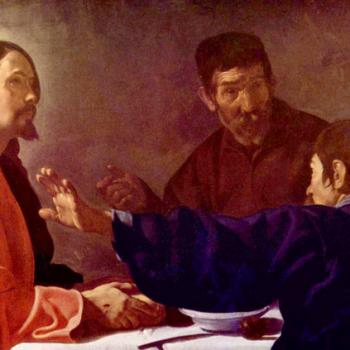At a conference in November I had what somehow became “post-Christian day.” It consisted of a series of conversations with friends who once were committed Christians but no longer found that faith to be compelling.
None of my friends is hostile to Christianity. For the most part they find that life works just as well if not better for them without it.
But in one conversation an old friend gently probed me: what is the faith that I hold and why am I still living my life playing this particular game?
Changes
I found the questions to be tricky to navigate. So many of the reasons I might have given at different times in my life I either no longer believe or else no longer find compelling.
- I recognize much more humanity in the pages of scripture than I did when I instinctively gravitated to the Bible as the word of God in high school and college, and went through an era in and after seminary in which I was willing to use the language of “inerrancy.” I don’t think that the Bible is a magic book or an instruction manual for life or even a completely coherent story from start to finish.

- I don’t find the notion of escape from coming judgment to be compelling. I do think that some notion of final judgment is important especially on the positive side of the ledger, to reward those who died in their faithfulness, but I wouldn’t join Christianity or keep to it out of fear of damnation. I’m just not interested in that as a major plot in the cosmic narrative (or in a god who would make that the primary theme of his story).
- I don’t have frequent experiences of existential connection with God. I honestly don’t know when the last time was that I felt like God answered a prayer. I have had some of these experiences, and they have been meaningful. But I also think that I could have these experiences as a vanilla theist or otherwise spiritual person without clinging to this particular Christian narrative.
- I find myself more likely to believe scientific explanations of events than miraculous ones. I don’t see God’s hand in every piece of good news or surprising happening. I’m not going to put my faith on the line against any scientific theory. (Spoiler alert: science almost always wins.)
If not that, then… what?
What’s Left
I have realized that the reason I keep identifying as Christian and hanging out with Christian people is that I find the story of Jesus deeply compelling. More than that, I think that if people actually lived into this narrative in keeping with Jesus’ invitation (and Paul’s depictions as well) that the world would be a better place.
What if?
What if Christians actually said, “The hell with everything else. The only thing that matters is, at each and every moment, asking ourselves, What does it look like to lay down our lives so that our neighbors might more fully live?”
That’s the big “What if?” that I believe Jesus has called us to try on. That’s the great Christian experiment. It’s an experiment that has been lived out better in obscure corners or under oppressive thumbs than in the mainstream flourishing of western civilization.
But what if?
Seven or eight years ago I was having a conversation with a non-practicing Catholic. As the conversation turned to matters religious he expressed his frustration at Christians who get all up in arms about whether someone disagrees with their theology. After all, “The whole point of religion is to make you a better person.”
Yes.
But the stories we tell, and the beliefs that form the narrative universe of these stories, give us the measures by which “better person” is judged.
Some of our Christian narratives have told us that the whole point is to get forgiveness from God. So we make ourselves “better people” by talking about how badly we suck in God’s sight, and thereby do our deeds of righteousness.
Some of our Christian narratives have told us that the whole point is to believe the right things. So we make ourselves “better people” by guarding our theology and anathematizing those who disagree with “Us.”
Those Christian narratives are impoverished and bankrupt. But their bankruptcy cannot compel me to give up the better one.
More Beautiful Than We Imagine
There is a Christian narrative drawing us forward to a better world than the one we can create by simply groveling or by hurling invectives or by coming up with more and more clever things to say about the Truth of Who God Is.
That better Christian narrative is the one that seems like it could never work. Not in a million years.
It’s the one that tells us that finding ourselves in corridors of power is the surest sign that we have taken a wrong turn.
It’s the one that tells us that if we will give up our lives we will find them in ways beyond our imagining.
It’s the one that tells us that not only our own souls but the whole creation itself discovers the flourishing for which it was created when we take our eyes off of our self protection, self-righteousness, and self-rightness. Life comes when we look to our friend and lay down our life on her behalf. Life comes when we look to our neighbor and love him as we love ourselves. Life comes when we take a good long look at what we want, more than anything, and give that as the gift–what we would want done for us.
I still believe. I still believe the story that tells me there is a God who honors this way of life which is, in its own way, the way of death. I believe that God honors it with life for the world. I believe that in its myriad micro-culminations it creates a more beautiful world than what we would create on our own.












